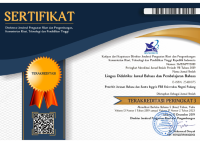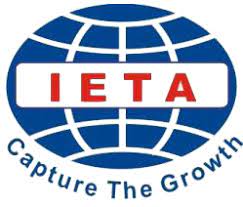Cognitive-Strategy Based Method Vs. Metacognitive-Strategy Based Method: The Impact on Listening Comprehension
 ), Muhammad Arid(3), Refnaldi Refnaldi(4),
), Muhammad Arid(3), Refnaldi Refnaldi(4), (1) Tadulako University
(2) Tadulako University
(3) Tadulako University
(4) Universitas Negeri Padang
 Corresponding Author
Corresponding Author
Copyright (c) 2024 Lingua Didaktika: Jurnal Bahasa dan Pembelajaran Bahasa
DOI : https://doi.org/10.24036/ld.v18i1.125288
Full Text:
 Language : en
Language : en
Abstract
The ability to speak English is very important, but it will not be successful without being supported by the ability to listen to understand the verbal language. The poor listening skills of the English Education students at Tadulako University in the final exam of the Listening for General Communication course became the basis for conducting this study. The results of the test showed that around 80% students failed the course with percentage intervals of comprehension levels of 0-39%. Therefore, this study is carried out to specify if using Cognitive-Strategy Based Method and Metacognitive-Strategy Based Method is effective in improving the participants’ listening comprehension as well as to compare the effectiveness of the two strategies. This study applied experimental design involving 80 samples evenly distributed in two classes. One class was instructed using Cognitive strategy, while the other one was taught using Metacognitive strategy. Results of data analysis demonstrated that both the Cognitive and Metacognitive strategies effectively improve the participants’ listening comprehension. There is no significant difference in terms of the effectiveness of both strategies in improving listening skills of the participants. In practice, they support each other resulting in learners better listening comprehension.
Keywords
References
Al-Azzemy, A. F. T., & Al-Jamal, D. A. H. (2019). Evaluating cognitive, metacognitive and social listening comprehension teaching strategies in Kuwaiti classrooms. Heliyon, 5(2), 1264. https://doi.org/10.1016/j.heliyon.2019.e01264
Arikunto, S. (2013). Prosedur Penelitian : Suatu Pendekatan Praktik (14th ed.). Rineka Cipta.
Chang, A. C. (2016). Chang, A.CS. (2016). In: (eds) English Language Education, vol 5. Springer, Cham. In H. Renandya, W., Widodo (Ed.), English Language Teaching Today (Vol. 5, pp. 111–125). Springer. https://doi.org/https://doi.org/10.1007/978-3-319-38834-2_9
Fathi, J., & Hamidizadeh, R. (2019). The contribution of listening strategy instruction to improving second language listening comprehension: A case of Iranian EFL learners. International Journal of Instruction, 12(2), 17–32. https://doi.org/10.29333/iji.2019.1222a
Firdaus, M. . (2019). Listening comprehension strategies used by EFL students in State University of Surabaya. Retain, 7(3), 48–56.
Ghanizadeh, A., & Alishahi, M. H. (2016). The bonds between EFL learners’ perceptions of classroom activities, self-regulatory skills, and language achievement. International Journal of Educational …, 3(2), 72–85. http://www.ijeionline.com/attachments/article/51/IJEI.Vol.3.No.2.07.pdf
Griffiths, C. (2018). The Strategy Factor in Successful Language Learning: The Tornado Effect (2nd ed.). Multilingual Matters.
Gunning, P., & Oxford, R. . (2014). Children’s learning strategy use and the effects of strategy instruction on success in learning ESL in Canada. System, 43(4), 82–100. https://doi.org/https://doi.org/10.1016/j.system.2013.12.012
Hamouda, A. (2013). An Investigation of Listening Problems Encountered by Saudian Students in the EFL Listening Classroom. International Journal of Academic Research in Progressive Education and Development, 2, 113–155.
Kristantiningsih, W. (2023). Wulandari Kristantiningsih. 11(1), 24–36.
Kumar, T.S., Nidhya, G.S., Vidhyalakshmi, C.N., Jegadeesan, P.R., & Jeeva, V. (2022). Effectiveness of Listening Strategies Enhancing Comprehensive Listening Skill of English Learners. Journal of Positive School Psychology, 6(3), 4111–4118. https://journalppw.com/index.php/jpsp/article/view/2331/1448
Liu, M., & Thondhlana, J. (2015). A study of Chinese University EFL learners’ foreign language listening anxiety, listening strategy use and academic listening performance. Indonesian Journal of English Language Teaching, 10(1), 30–47.
Mahbubah, L., Mahbubah, L., Fauzi, F. Al, & Basya, D. (2019). EXAMINING GUIDED NOTE TAKING METHOD TO ASSIST LISTENING SKILL AT MADRASAH ALIYAH ARRISALAH CURAH KATES AJUNG. E-LINK JOURNAL, 6(2), 212–215. https://doi.org/10.30736/ej.v6i2.174
Manihuruk, L.M.E., & Sidabutar, Y. . (2020). Jurnal basicedu. Jurnal Basicedu,. Jurnal Basicedu, 5(5), 3(2), 524–532. https://journal.uii.ac.id/ajie/article/view/971
Mertosono, S. R., Erniwati, E., Hastini, H., & Arid, M. (2020). Using POSSE Strategy in Teaching Reading Comprehension. Ethical Lingua: Journal of Language Teaching and Literature, 7(2), 321–328. https://doi.org/10.30605/25409190.214
Movahed, R. (2014). The Effect of Metacognitive Strategy Instruction on Listening Performance, Metaconitive awareness and Listening anxiety of Beginner Iranian EFL Students. International Journal of English Linguistics, 4(2), 88–99. https://doi.org/10.5539/ijel.v4n2p88
Ratnaningsih, D. (2015). the Effects of Cognitive and Metacognitive Listening Strategies on Students’ English Listening Comprehension in a Merchant Marine Polytechnic. Magister Scientiae, 0(37), 15–28. http://journal.wima.ac.id/index.php/Magister_Scientiae/article/view/727
Sadiku, L. M. (2015). The Importance of Four Skills Reading, Speaking, Writing, Listening in a Lesson Hour. European Journal of Language and Literature, 1(1), 29. https://doi.org/10.26417/ejls.v1i1.p29-31
Solak, E., & Erdem, G. (2016). Teaching Listening Skills. In E. Solak (Ed.), Teaching Language Skills for Perspective English Teachers (pp. 29–44). Pelikan.
Whitehead, E. (2020). Application of Meta-Cognitive Strategy Instruction in Listening Comprehension to the Level III Student Teachers. The Excellence in Education Journal, 9(1), 104–119.
Yeldham, M., & Gruba, P. (2014). The development of individual learners in an L2 listening strategies course. Http://Dx.Doi.Org/10.1177/1362168814541723, 20(1), 9–34. https://doi.org/10.1177/1362168814541723
Zhang, L., & Seepho, S. (2013). Metacognitive strategy use and academic reading achievement: Insights from a Chinese context. Electronic Journal of Foreign Language Teaching, 10(1), 54–69.
Zheng, J. (2018). The Metacognitive Strategy in English Listening Comprehension. Theory and Practice in Language Studies, 8(2), 226–231. https://doi.org/10.17507/tpls.0802.07
 Article Metrics
Article Metrics
 Abstract Views : 232 times
Abstract Views : 232 times
 PDF Downloaded : 114 times
PDF Downloaded : 114 times
Refbacks
- There are currently no refbacks.
Copyright (c) 2024 Lingua Didaktika: Jurnal Bahasa dan Pembelajaran Bahasa

This work is licensed under a Creative Commons Attribution-NonCommercial 4.0 International License.









